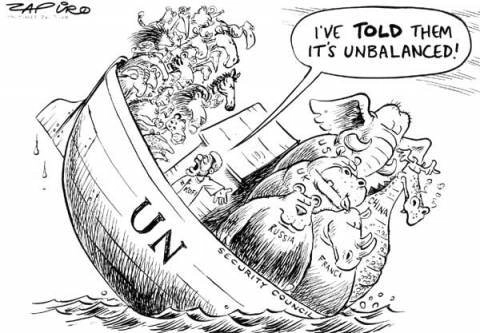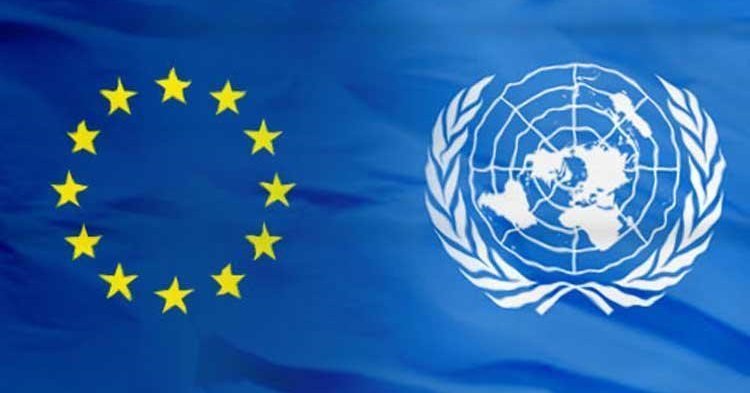The UN is not an easy arena for the European Union. Driven by a strictly intergovernmental logic, its policy outcomes completely rely on its members. Full membership is therefore only given to internationally recognised states.
Nevertheless, since the first contact between the EU and the UN in the 1960s, the EU has managed to get a remarkable standing and influence in the UN system. The EU has aligned itself with the UN mission “to promote international peace, human rights and development” and is dedicated to the political principle of multilateralism. The Union obtained an extended observer status entitling it with the right to present common positions, make interventions and present proposals. In some UN organisations such as the WTO, the EU even became a full participant with equal rights to those of state members.
Still, the overall influence of the EU within the UN system remains limited and dependent on its member states: The EU doesn’t have the right to vote, to co-sponsor draft resolutions or to put forward candidates. Furthermore, it is neither a member of the General Assembly nor the Security Council. Despite Article 34, which urges the EU members to coordinate their politics within UN matters, the EU shows in addition a lack of coherence and unity in delicate political questions, such as disarmament or Security Council issues.
Against this backdrop, a European seat in the General Assembly and the Security Council is more and more discussed within a possible UN reform. Supporters of such an idea are convinced that a deeper European integration could facilitate processes within the UN and therefore lead to faster and more effective solutions to international crises. Sceptics doubt the overall benefit of a stronger position of the EU in the UN given its restrictive migration policy as one example.
The New Federalist: How would you judge the new German coalition treaty concerning foreign policies?
Richard Gowan: It is a reasonably cautious document, which highlights an interest in multilateralism. Further, commitments to for example a UN peacekeeping mission in Ukraine show on the one hand Berlin’s willingness to take the UN seriously and on the other hand an increasingly important role of Germany within the UN system. The overall foreign policy is not marked by any dramatic changes, following the path of former coalition policies. I hope that we will continue to see a clear dedication to multilateralism.
The New Federalist: Clearly we see path dependency in German politics, also on the question of the European and German seat within the UN Security Council. Against this backdrop is it believable that the German government favours a European instead of a German seat, as stated in the new coalition treaty?
Richard Gowan: I don’t believe that Germany seriously imagines that an EU seat in the Security Council will be possible any time soon. Further, I don’t believe that German officials believe in the possibility of a German seat in the Security Council, although Germany continues to campaign for that to remind other countries on the German influence within the UN system.
“French officials don’t want to sacrifice their autonomy for the sake of an EU seat.”
The New Federalist: Will France nevertheless as the only remaining member of the EU in the UNSC be willing to give up on its membership for a European membership?
Richard Gowan: With Brexit, France will be the only EU member in the UNSC and the French signalled that they would like to work more closely together with Germany concerning Council affairs. Nevertheless, the French made clear that there is no possibility to turn their seat into a European seat. President Macron is indeed very pro-European, but he underscored that France is an independent global power and French officials won’t sacrifice their autonomy for the sake of a European seat.
The New Federalist: Even though the likelihood of an official EU seat is small, we see new European initiatives and a somewhat closer European integration within the Common Foreign and Security Policy. Which effect does this have on the UN, if any?
Richard Gowan: The real question is what the focus of a stronger Common Foreign and Security Policy in the UN would be. With some issues on the UN agenda, such as the security in the Sahel, Europe has raised its game a lot, but the French still feel that they have to carry most of the burden. Although other EU members have got more invested in security issues, the overall effort doesn’t meet French expectations. Under these conditions a Europeanised UN policy remains unlikely.
The New Federalist: Would a stronger European foreign policy nevertheless facilitate political processes within the UN, strengthen its missions and the UN as a multilateral body?
Richard Gowan: The voice of the EU is in some cases already unified and carries weight within the UN system. Despite this fact the process of a unified European position stays delicate, because the energy invested in finding a common internal position can’t be invested in negotiations with third parties. Especially in the context of Brexit, which leads to a loss of diplomatic weight, the EU should formulate a firm and unified position on UN affairs. The EU is on the defensive, facing challenges such as Russian security issues and American foreign policy under the Trump administration. It is therefore important for the EU to stand together.

The New Federalist: As you already said, the EU speaks with one voice in some UN agencies and obtained a full participant in others. Should this status be expanded to other agencies?
Richard Gowan: There are already mechanism to ensure common EU positions, such as burden sharing by one country that carries the EU position or official agreements on a common EU position. Still, there are limits to this mechanisms and some members like Hungary deliberately undercut EU’s position, disagreeing with certain values that the EU stood up for as a block for a while. The question of a full participant status for the EU therefore depends on the respective area. In some, such as budgetary negotiations, European cohesion is important, because the EU is an important contributor to the UN budget. In the area of a nuclear disarmament for example the EU remains and will remain deeply divided.
The New Federalist: Against the backdrop of differences on important questions, do you think it’s necessary for the EU to take foreign policy decisions even against some member states’ opinions?
Richard Gowan: Certain EU members specifically Hungary, but also to some extent others like Greece have undermined EU unity or held the rest of the EU hostage by taking very strong lines in the EU coordination procedure about for example limiting liberal policies on migration, as in the Hungarian case. Therefore, if some member states are isolated, the other members should show unity and underscore internal cohesion. Still, if we move too fast in matters of supranational foreign policy, we will see a fragmentation of the EU quite quickly. To be honest 10 or 20 years ago we were moving towards a single EU voice on foreign policy issues at the UN, but today we are further away from this objective, because there are certain spoilers in the system.
The New Federalist: Britain has often been seen as one of those spoilers at least in the field of the common foreign policy. In the context of Brexit, is a “full participant” status including full rights for the EU in the General Assembly more probable?
Richard Gowan: With the UK leaving, one major blocker for a unified foreign policy is gone. Nevertheless, the UK has also been a source of unity to the EU being a mediator in for example some human rights issues between the progressive north and the restrictive east. Brexit therefore sometimes makes a common position easier, but makes it harder on other issues. Nevertheless, I think the EU won’t reach a status in the General Assembly similar to its standing within the WTO. There are too deep differences between the EU members for it to ensure a single voice within General Assembly affairs. Furthermore, the will of the member states to preserve their independence remains a key obstacle.
“Trying to create an artificial united EU would be a mistake.“
The New Federalist: Is it nevertheless desirable that the EU becomes a full member of the General Assembly or even a permanent member of the Security Council?
Richard Gowan: The EU delegation becomes quite effective within the General Assembly and also in the UN structures in Geneva it becomes a more effective player. Given the fact that the EU diplomats are successful and constructive multilateralists, this EU engagement in UN affairs is positive, especially regarding its engagement in humanitarian affairs. A unified seat would nevertheless only be possible with a coherent basis of foreign policies, from which the EU is still quite far. An artificial united EU would be a mistake.
Concerning the UNSC, the idea of the French partially Europeanising their seat for greater coordination with other countries and exchanging staff is attractive. Especially in times of Brexit, France should involve other EU members in their UN diplomacy. Despite this engagement, France doesn’t feel obliged to represent EU positions. A single European seat in the Security Council is even less probable and at least two rounds of reform away. Unless massive geopolitical changes with wide-ranging effects occur, a European seat is not very likely.
“I want to see a stronger EU presence at the UN.”
A European seat in the General Assembly is in theory desirable, but in diplomatic practice EU unity is challenged by Hungary and other countries. I nevertheless want to see a stronger EU presence within the UN system, because the EU is a major aid donor and humanitarian actor, which would have more influence shaping concrete policy, if it was more unified. This might be achievable through a single seat, but given the unlikelihood of this event, it would right now be better for some members within the EU to form coalitions defending majoritarian European core values.
The New Federalist: Thank you very much for your time.
About Richard Gowan
Richard Gowan is the Research Director at the NYU Center on International Cooperation. Furthermore, he is a Senior Policy Fellow at the European Council on Foreign Relations. Richard Gowan is also the overall editor of the Annual Review of Global Peace Operations and has written on the EU‘s role in state-building, cooperation between the EU and the UN and multilateral human rights diplomacy. He has written for several newspapers, websites and academic journals and writes the weekly column “Diplomatic Fallout.“ He is currently working on a book about the international response to the Syrian conflict and its lessons for future crisis management initiatives.


Follow the comments: |
|
